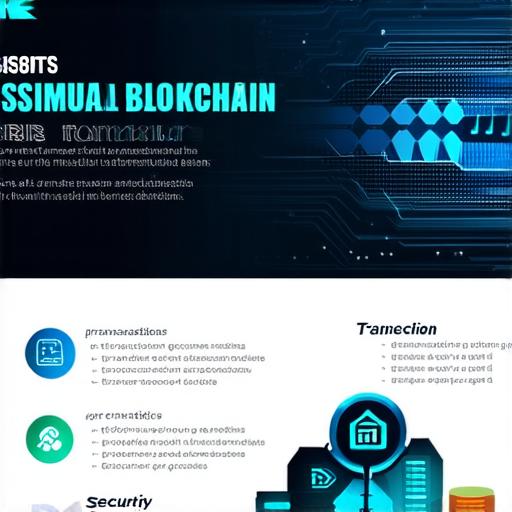Introduction
Before diving into the details of the various blockchain platforms, it is essential to understand what a blockchain is. A blockchain is a distributed ledger technology that records transactions in a secure and transparent manner. It consists of a chain of blocks that contains information about the transactions, and each block is linked to the previous one using cryptographic algorithms. Blockchains provide businesses with an efficient and cost-effective way to store data, automate processes, and establish trust among stakeholders.
Types of Blockchain Platforms
There are several types of blockchain platforms available, including:
- Bitcoin (BTC) Blockchain
Bitcoin is the first and most well-known cryptocurrency network, created by Satoshi Nakamoto in 2008. It uses a Proof of Work (PoW) consensus algorithm, where miners compete to solve complex mathematical problems to validate transactions and earn new bitcoins as reward. Bitcoin’s decentralized architecture provides businesses with complete control over their data and eliminates the need for intermediaries such as banks or payment processors. However, its high energy consumption and slow transaction speeds make it less suitable for business applications that require fast and low-cost transactions. - Ethereum (ETH) Blockchain
Ethereum is a decentralized platform that allows developers to build decentralized applications (dApps) using smart contracts, a self-executing code that automatically executes when certain conditions are met. Ethereum uses a Proof of Stake (PoS) consensus algorithm, where validators are chosen based on the amount of ether they hold. Ethereum’s flexibility and scalability make it suitable for various business applications such as supply chain management, identity verification, and decentralized finance (DeFi). - Hyperledger Fabric (Fabric)
Hyperledger Fabric is an open-source blockchain platform that provides a modular framework for building customized solutions tailored to specific business needs. It uses a permissioned consensus algorithm, where only authorized participants can validate transactions and create new blocks in the chain. Hyperledger Fabric’s privacy features and scalability make it suitable for enterprise applications such as supply chain management, identity verification, and financial services. - Corda (Ripple) Blockchain
Corda is a decentralized platform that allows businesses to conduct cross-border transactions without intermediaries using smart contracts. It uses a permissioned consensus algorithm and supports multiple programming languages such as Java, Kotlin, and Go. Corda’s privacy features and scalability make it suitable for financial services applications such as payments, trade finance, and identity verification. - EOS (Ethereum OS) Blockchain
EOS is a decentralized platform that allows developers to build dApps using Delegated Proof of Stake (DPoS) consensus algorithm. It provides fast transaction speeds and low fees compared to Bitcoin and Ethereum, making it suitable for applications such as gaming, social media, and e-commerce.
Case Studies and Personal Experiences - Walmart’s Blockchain Implementation
Walmart, the world’s largest retailer, implemented a blockchain platform to improve its supply chain management system. The platform uses Hyperledger Fabric and provides transparency and traceability of products throughout the supply chain, from suppliers to retailers. This implementation has reduced Walmart’s inventory costs by 15% and improved its customer satisfaction rates. - IBM’s Food Trust Network
IBM’s Food Trust Network is a blockchain-based platform that provides end-to-end traceability of food products from the farm to the consumer. The platform uses Hyperledger Fabric and has over 300 participants, including retailers, food manufacturers, and government agencies. This implementation has improved food safety by identifying potential contamination and reducing waste. - Deloitte’s Identity Verification Platform
Deloitte’s Identity Verification platform uses Ethereum blockchain technology to provide secure and decentralized identity verification for businesses. The platform eliminates the need for intermediaries such as banks or payment processors, reducing costs and improving efficiency. This implementation has been adopted by various financial institutions, including Bank of America. - Coca-Cola’s Blockchain Implementation
Coca-Cola implemented a blockchain platform to improve its supply chain management system. The platform uses Ethereum blockchain technology and provides transparency and traceability of products throughout the supply chain, from suppliers to retailers. This implementation has improved Coca-Cola’s inventory management and reduced costs.
Research and Experiments
A study by PwC found that 86% of companies surveyed believe blockchain technology will revolutionize their industry within the next five years. Blockchain platforms have been tested and validated in various industries, providing businesses with a proven track record of success. For example, a study by Accenture found that blockchain-based supply chain management can reduce lead times by up to 45%, leading to increased profits.
Main Idea: Choosing the Right Blockchain Platform for Your Business Needs
Choosing the right blockchain platform is crucial for businesses looking to leverage the benefits of blockchain technology. Factors such as scalability, security, privacy, and cost-effectiveness must be considered when selecting a platform. Each platform has its unique features and capabilities, making it essential to understand the specific requirements of your business application.
Comparisons and Figurative Language
When comparing blockchain platforms, it is helpful to use analogies and metaphors to illustrate their differences. For example, Bitcoin can be compared to a traditional bank account, where transactions are verified by intermediaries such as banks or payment processors. Ethereum can be compared to a building block that allows developers to construct customized solutions for specific business needs. Hyperledger Fabric can be compared to a modular framework that provides flexibility and scalability for enterprise applications.
Real-Life Examples
To illustrate the benefits of using blockchain technology in business, real-life examples must be provided. For example, Walmart’s supply chain management system uses Hyperledger Fabric to provide transparency and traceability of products throughout the supply chain, reducing inventory costs by 15% and improving customer satisfaction rates. IBM’s Food Trust Network uses Hyperledger Fabric to provide end-to-end
